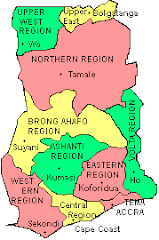Today, being Friday, there was at a meeting at the office with most of the Mofa staff and we worked out that next week I’ll accompany the AEA’s to meet with their farmer groups. It’s been a couple weeks but with some issues going on at work like the director loosing his mother, the former director passing away after being in the hospital for a while, as well as some trouble with securing tractor owners and operators to plow a certain amount of acres for a rice expansion project funded by Mofa at the national level. With this in mind, I haven’t quite found my niche within Mofa as some things are out of my control, and I’ve been trying to put myself out there as ready and willing to contribute but with little success so far. Maybe I’m used to the work setting in Canada where you start a new job and things are clear as to what your responsibilities are and other’s expectations become clear pretty quickly usually.
However, at the director set the tone and told the AEA’s that I’ll be working with them next week and then I set up the dates where I’ll go with them to meet farmer groups to introduce myself, ask some questions, and give the heads up about the AAB program that we’re piloting in this district, which means future meetings with farmer groups to discuss the AAB curriculum facilitated by AEA’s. Once the momentum picks up I’ll explain Agriculture as a business (AAB) in more detail.
I’m not entirely sure of my audience, i.e. who is following along and reading, therefore I’m trying to cater to a diverse audience and cover many different aspects of my experiences in Ghana. I also just realized that a blog setting may have prevented people from commenting – apparently you had to have a blog account to do so – but I changed it so anyone can comment. Hopefully I’ll receive some input from readers so I can answer some questions and describe specific things in more depth.
I was given the opportunity to attend an important meeting in Bolga that concerned the entire Upper East Region though. It was the launching (or sensitizing as they say here) of the Northern Rural Growth Program (NRGP) which is a 100 million (US$) project designed to help develop the three northern regions of Ghana mainly funded by the African Development Bank and the International Fund for Agriculture Development? (I think that’s what IFAD stands for). Anyways, the program looks like it’s taking a good approach and the potential is exciting. I’m not naïve and remain critical and skeptical but I don’t know enough to judge and I’m remaining positive and thinking about how EWB can fit into this project which overlaps a bit with AAB. In fact, Roy is the program coordinator who used to be the regional director of Mofa and helped develop AAB in collaboration with EWB. Meghan (my coach/colleague) and I chatted with Roy after the meeting about how the funds will be made available to the districts through what they’re calling the Commodity Business Plan. Stakeholders from the district like farmer groups, land owners, Mofa, banks, town planners, and so on will come up with a business plan based on the commodity they are planning on producing, which will be based on the demand and market. This approach seems pretty interesting: looking at markets and demand before actually producing a commodity.
For instance, one can look at how Guinness here in Ghana is only obtaining about 10% of its sorghum needs locally while importing the rest. A district could then come up with a business plan and apply for funding so it can improve infrastructure like roads and irrigation, in order to produce sorghum for this particular market. Although the stats here are factual, I came up with a simplified example trying to illustrate the approach. Of course many other factors and issues around the production of sorghum exist and I’m not entirely sure how the business plan process will be carried out. I was actually talking to the accountant here at Mofa about this issue and we both had a number of questions about how the funding will be disbursed. For example, how can they ensure that farmers’ voices will be heard as much as bank managers and investors or wealthy land owners? Who will decide which representatives will be involved in the process of creating the business plan? Will some people from certain districts have the upper hand by gaining access to certain market information that is not widely available? The district I’m in, Kassena-Nankana West, was formed only about a year ago and I can say with some level of certainty that it’s an underdog district lacking basic funds, so these questions literally hit close to home – seeing as how I live across from the Mofa office.






No comments:
Post a Comment